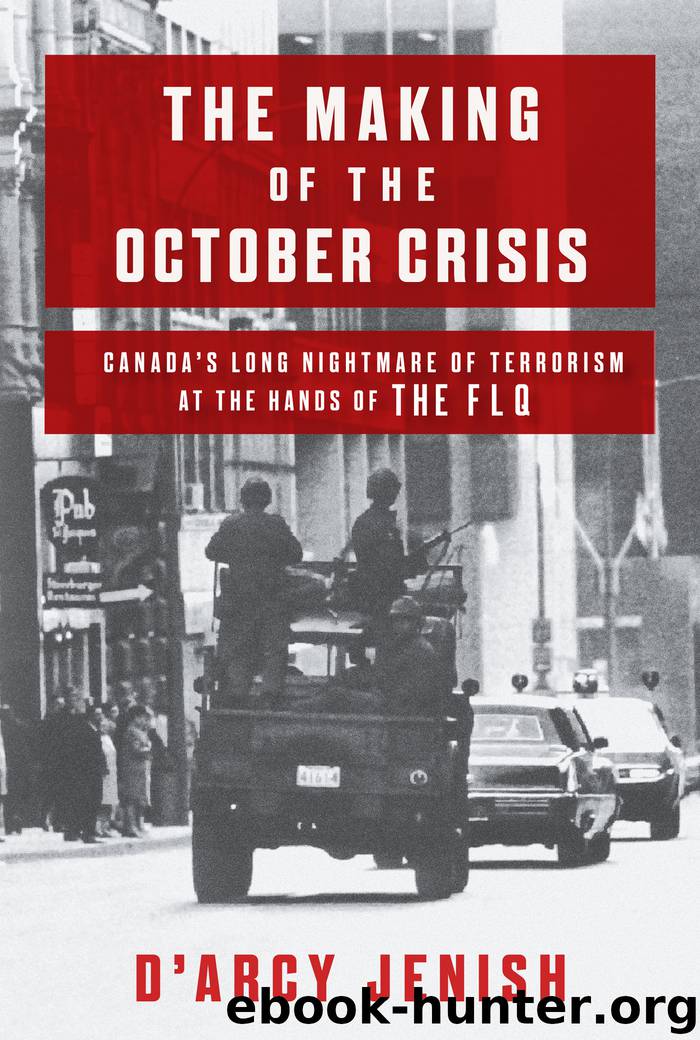The Making of the October Crisis by D'Arcy Jenish

Author:D'Arcy Jenish
Language: eng
Format: epub
Publisher: Doubleday Canada
Published: 2018-09-24T16:00:00+00:00
* * *
—
No one was arrested for the postal bombing or the attack on McGill. Nor were the briefcase bombers apprehended. Their crimes remained unsolved for nearly three years, until one evening in early May 1972, when a young firefighter walked into the Côte-des-Neiges police detachment next door to his firehall and said he had something to confess. He said it was about bombs. He said he had planted a lot of bombs in Montreal. This was no case for a suburban detachment, so the officer in charge called the Section de récherche sur la criminalité, a branch of the force that included the anti-subversive unit, the organized crime section and the bomb squad.
Gilles Forgues, a lieutenant-detective at the time, took the call from Côte-des-Neiges. “We went to the station,” Forgues recalled in an interview, “and we started talking to this firefighter and we decided we better bring him downtown. We took him to a quiet room on the second floor and the detectives who were with me started talking to him. It was about 9:30 by then.
“He kept talking and talking and said I was the one who planted this bomb and I was the one who planted that bomb, but all of a sudden he stopped. The detectives came to me in the other room and said, ‘He doesn’t want to talk anymore. He wants to see a priest.’ He looked bizarre, but he spoke fluently.
“So I said ‘No problem,’ and I went downstairs and I got a white scarf that resembled the stole that priests wear and I put it around my neck and I went back upstairs and I sat with him. And he said he wanted to pray so we got down on our knees and we prayed—in Latin. Then he wanted to make a confession so I said: ‘Okay my son, go ahead.’ So he started talking, but he was talking so fast that I raised my hand and I said: ‘Whoa, my son. God won’t be able to understand you. We’ll have to write it down so it’s exactly like you’re talking to me, but you’re talking to God.”
And the young man agreed. His name was Georges Dubreuil. He was twenty-nine and lived at that time Saint-Eustache, northwest of Montreal, though he had resided in the city during the bombing spree. His confession took twelve hours and proceeded in fits and starts. He would provide Forgues and his fellow detectives with an account of a bombing, then he would stop and insist on more prayer. He and Forgues would kneel and pray while the other detectives retrieved Côté’s reports to confirm that the two accounts matched.
By the time he was done, Dubreuil had taken responsibility for fifteen bombings. He acknowledged that he had been the leader of a gang and he disclosed the identities of his accomplices. He had worked most closely with his friend Jocelyn Bonneville and to a lesser extent Bonneville’s brothers, Paul, then a Hydro-Québec employee, and Alain, a student and former president of the RIN‘S youth wing.
Download
This site does not store any files on its server. We only index and link to content provided by other sites. Please contact the content providers to delete copyright contents if any and email us, we'll remove relevant links or contents immediately.
| Arms Control | Diplomacy |
| Security | Trades & Tariffs |
| Treaties | African |
| Asian | Australian & Oceanian |
| Canadian | Caribbean & Latin American |
| European | Middle Eastern |
| Russian & Former Soviet Union |
The Secret History by Donna Tartt(16627)
The Social Justice Warrior Handbook by Lisa De Pasquale(11489)
Thirteen Reasons Why by Jay Asher(7788)
This Is How You Lose Her by Junot Diaz(5775)
Weapons of Math Destruction by Cathy O'Neil(5038)
Zero to One by Peter Thiel(4824)
The Myth of the Strong Leader by Archie Brown(4789)
Promise Me, Dad by Joe Biden(4449)
Beartown by Fredrik Backman(4420)
Stone's Rules by Roger Stone(4417)
How Democracies Die by Steven Levitsky & Daniel Ziblatt(4399)
The Fire Next Time by James Baldwin(4343)
100 Deadly Skills by Clint Emerson(4079)
A Higher Loyalty: Truth, Lies, and Leadership by James Comey(4033)
Rise and Kill First by Ronen Bergman(4012)
The David Icke Guide to the Global Conspiracy (and how to end it) by David Icke(3883)
The Farm by Tom Rob Smith(3872)
Secrecy World by Jake Bernstein(3783)
The Doomsday Machine by Daniel Ellsberg(3732)
